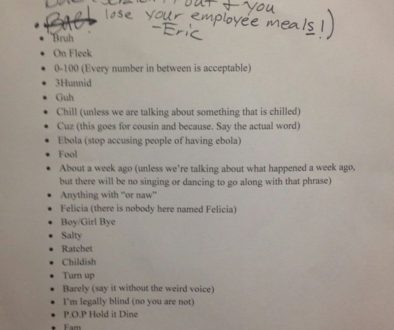Four Ways to Solve Workplace Problems: Don’t Try to Fix Them
One of my favorite magazines is Entrepreneur magazine. Although it isn’t focused on organizational strategy, it is focused on the future of work.
One of the features they have is a Q&A. And this one caught my attention.
“Employees at my restaurant are taking food home without paying for it and are not charging their friends for drinks. I made it clear that I’ll fire people if the behavior continues, and I bought locks for the refrigerators. However, I remain angry. How do I trust my staff after this betrayal?”
The answer was pretty typical. In part it said, “Rather than asking how you can trust your staffers, figure out how you can communicate effectively that their behavior negatively affects the restaurant’s success–and their future with the company.”
There are two major issues I see here.
The first is they don’t care about the restaurant’s success. It is very unlikely that because of the little amounts they steal that the restaurant will shut down. Plus, they are not there for your success. They are there for (most often) their survival. Which is one reason why they are stealing food.
The second is regarding the point of “their behavior negatively affects …their future with the company.” This is only another threat. Pile those up and sticky fingers will soon be only one of many major issues you will need to deal with.
The Management Paradox
Management is about controlling the outcomes. When outcomes don’t go their way, they often get set in a spiral:
- Employees steal.
- Management threatens with being fired.
- Locks are put on refrigerators.
- Processes and policies are put in place.
- Processes and policies cost time and resources and double checking.
- Cost of service goes up.
- To cover, cost to customers go up.
- The locks are a physical symbol that management doesn’t trust them.
- Employees find another way to continue doing what they have been doing.
- Repeat.
Take this and duplicate it in a number of contexts. No wonder management is such an energy draining activity!
Transcending the Issue
Rather than deal with the issue, create an environment in which the issue is starved and will have a very hard time existing. Here are some ideas.
1) Team accountability
Rather than being accountable to a manager, make them accountable to each other. It is easy to dupe one person. Duping a whole team? Not so easy.
2) Trust them with specific things
In restaurants (and, frankly, most office environments), employees have very little say in anything they do. Find ways to give them a choice and have control themselves. For example, you may decide to leave the scheduling to the team. Back out and let them figure out what is best. There are so many ramifications in this one move that I won’t detail out now – but you better be ready for a number of instances where detoxing of negativity will naturally happen. And then you need to be able to lead them to a new spot.
2) Open up the financials
That’s right. Let the employees see where you are struggling and where you are doing well. They will look for specific ways to improve the overall performance. The question is, “Will they even care?” Some won’t. At least at first until…
Base a portion of their pay on team or (in this case) restaurant performance
If they understand that a bonus or part of their base pay comes to them because of superior work as a team, they will actively try to be better.
Now, does that mean that no one will ever steal again? Not at all. But the chances of them stealing dramatically decreases.
Warning. Be sure to make this more of a bonus, rather than a retraction. For example, if they are paid $15/hr, don’t hold back part of their pay as the team performance and pay them only $12/hr. Keep it at $15 and their improvements will be on top of that.
It’s Not About Stealing
Now take the generic version of this problem. It could be coming in late, spending too much time on social sites, being apathetic and lacking drive…
Rather than fix the issue, transcend it. Create an environment where the issue starves and you don’t need to deal with it.


